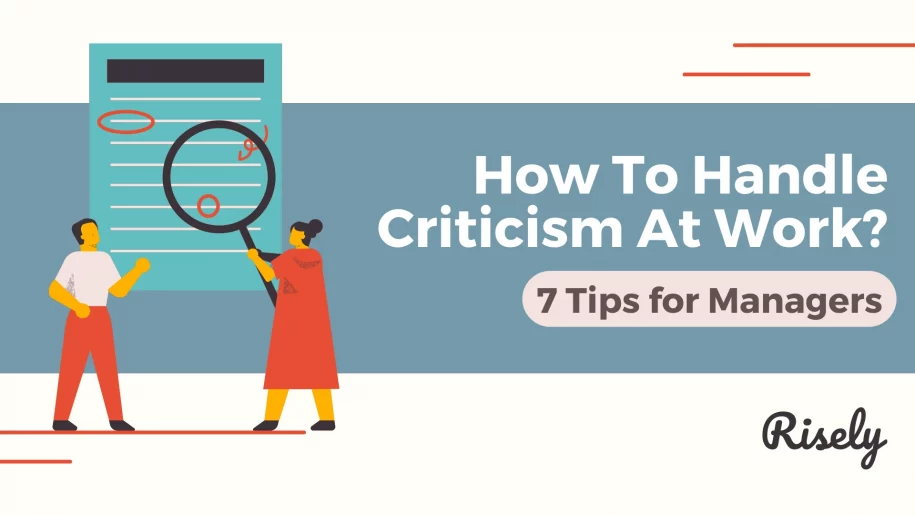How To Handle Criticism At Work? 7 Tips For Managers
Handling criticism at work is a challenge that many managers face. Criticism can be difficult to handle whether it’s from their superiors, peers, or subordinates. However, it is an integral part of your personal and professional growth. In this blog, we will discuss how you can effectively handle criticism in the workplace. We will explore the difference between constructive and destructive criticism, the importance of criticism for managerial growth, and strategies for preparing yourself mentally to receive criticism.Let’s Understand Criticism in the Workplace
Criticism in the workplace can take different forms, and you need to understand how to handle it effectively. One key aspect to consider is the difference between constructive and destructive criticism. It is natural to have emotional reactions when faced with criticism. However, it is important to manage these emotions and not let them cloud your judgment or hinder your growth. By understanding the intention behind the criticism and separating it from personal attacks, you can better handle criticism and use it as an opportunity for self-improvement.What is The Difference Between Constructive and Destructive Criticism at Work?
Constructive criticism, also known as constructive feedback, aims to help you improve your performance or behavior. It focuses on specific areas for improvement and provides actionable suggestions for growth. Constructive criticism is delivered in a respectful and supportive manner, with the intention of helping the recipient succeed. Let’s look at an example of constructive criticism to understand this better:“I’ve noticed that your recent reports have some minor errors, such as typos and incorrect data entries. I appreciate your efforts and attention to detail, but to improve accuracy, it might be helpful to double-check the data and run a spell-check before submission. Let me know if you need any tools or support to help with this.”
There are three key things why this sort of criticism at work can help you:- First, they come with an issue that they noticed specifically. The criticism is not vague or subjective.
- Second, it’s positively reinforced with phrases like “I appreciate…”
- Third, this criticism at work also comes with an offer of help. It shows that the aim is improvement and making mistakes is not the end-all.
“Your reports are always full of mistakes. Do you even care about your work? This is unacceptable.”
The two messages point to the same issues, don’t they? However, the structure and tone make a lot of difference in how criticism at work impacts someone. In this example, we see a lack of nuance. It does not offer specific direction or guidance but instead creates resentment. Destructive criticism can hinder growth and create a negative work environment. Being able to differentiate between helpful and harmful criticism is crucial for effectively handling criticism at work. Helpful criticism is constructive and aims to provide feedback that can lead to your personal and professional growth. It focuses on specific behaviors or actions and offers suggestions for improvement. On the other hand, harmful criticism is often personal attacks that do not offer any constructive feedback or solutions. To determine the nature of the criticism, consider the intention behind it. Helpful criticism is usually given with the intention of helping the individual grow, while harmful criticism is often driven by personal biases at work or the desire to belittle or demean others. You should also consider the source of the criticism. Feedback from trusted individuals who have a genuine interest in your development is more likely to be helpful, while criticism from individuals with ulterior motives or a history of negative behavior may be harmful.Other Interesting Reads
How to handle criticism at work effectively?
Handling criticism effectively starts with preparing yourself mentally to receive feedback. This involvesDevelop a Growth Mindset
Developing a growth mindset is essential for effectively handling criticism. A growth mindset is the belief that abilities and skills can be developed through dedication and hard work. It allows you to view criticism as an opportunity for growth rather than a personal attack. To develop a growth mindset, embracing challenges, persisting in the face of setbacks, and seeing effort as a path to mastery is essential. You can cultivate a growth mindset by reframing negative thoughts and focusing on the potential for growth and learning.Stay Calm and Collected
When you face criticism at work, it is natural to have emotional reactions such as anger, defensiveness, or self-doubt. However, pausing and taking a deep breath before responding is important. Practicing active listening, which involves fully focusing on the speaker and seeking to understand their perspective, can help manage emotional reactions. Reframing negative thoughts by challenging self-limiting beliefs and focusing on the potential for growth can also help one stay calm and collected. Moreover, remember that not every criticism is meant to hurt or disrespect you. A lot of it will come from well-meaning folks thinking of your growth.Listen Actively Without Becoming Defensive
Responding to criticism effectively is crucial for your growth. Active listening is step one in this process. It involves entirely focusing on the speaker, maintaining eye contact, and using open body language to show that you are engaged and attentive. When receiving criticism, try to resist the urge to become defensive. Instead, you should listen to the feedback without interrupting or making excuses. Take the time to understand the speaker’s perspective and acknowledge their concerns to help diffuse tension and facilitate a productive conversation.Ask Clarifying Questions to Understand the Feedback
Asking clarifying questions is an effective way to understand the feedback and ensure that you clearly understand the issues raised. This can help you address misunderstandings and gain a deeper insight into the speaker’s perspective. When receiving criticism, you can ask questions such as, “Could you provide more specific examples?” or “What suggestions do you have for improvement?” These types of questions help elicit specific and actionable feedback. It also helps you demonstrate their commitment to growth and improvement. It also shows that you value the speaker’s feedback and are open to constructive criticism. It promotes a culture of open communication and continuous learning within the workplace. Read more: 20 Active listening questions to help you become a better listenerTurn Criticism into Actionable Steps
Turning criticism into actionable steps is crucial for personal and professional growth. It involves identifying the core issues highlighted by the criticism and setting SMART goals to address them. When faced with criticism, you should take the time to reflect on it and identify the underlying issues that need to be addressed. You need to look beyond the surface-level feedback and understand the root causes of the criticism. Once you know the root causes, you can set SMART goals to address them with a clear framework that suits you.Dealing with Unfair or Unwarranted Criticism
We proceed with a positive mindset regarding criticism at work. But there are situations where you genuinely receive criticism for no reason. It could be a workplace bully taking it out on you or, in general, a person with a difficult attitude on the team. Unfair or unwarranted criticism is indeed challenging to handle, but it is crucial to address it professionally and calmly. Instead of reacting defensively or impulsively, take a moment to reflect on the criticism and consider if it is valid or if it is a result of personal bias or misunderstanding. If you find that the criticism is unwarranted, calmly and assertively express your disagreement and provide evidence to support your point of view. Remember, maintaining a positive attitude is key, as it empowers you to not let unwarranted criticism affect your self-confidence or motivation.How can you handle unwarranted criticism at work?
- Seek clarification: Ask for specific examples or evidence to support the criticism. It can help you understand the perspective of the person giving the criticism and provide an opportunity for constructive dialogue.
- Express your perspective: Calmly and assertively share your side of the story and provide evidence to support your point of view. Avoid getting defensive or engaging in an argument.
- Focus on solutions: Instead of dwelling on the unfair criticism, shift the conversation towards finding solutions or addressing any underlying issues. It redirects the focus to productive and constructive discussions.
- Seek support: If the unfair criticism persists or affects your well-being, consider consulting a trusted colleague, supervisor, or HR representative for guidance and support.
Is someone being overtly critical at work? Discuss the situation with Merlin, Risely’s AI coach today. It’s free. You will get help with:
- Identifying any signs of bad behavior, if present
- Recognizing what skills you need to handle the situation better
- Role-playing the confrontation to address criticism at work effectively
To Wrap Up
Viewing criticism as an opportunity for personal development and growth is essential for handling criticism at work. Instead of taking criticism personally or getting defensive, use it as a chance to reflect on your actions and behaviors and identify areas for improvement. Personal development involves continuously learning and evolving. By embracing feedback, you can gain valuable insights into your strengths and weaknesses and work towards becoming a better manager. It can include seeking out training opportunities, reading books or articles on leadership and management, and seeking guidance from mentors or coaches.Do you listen actively to feedback?
Find out now with the free active listening assessment for managers.
Other Related Blogs
How to Set Effective Learning and Development Goals?
This blog highlights how effective learning and development goals are set, why is setting them important for your organization and what challenges you might face during this process. … Read…
Are you on track to meet your Q1 goals?
Are you on track to meet your Q1 goals? We are in the middle of the first quarter of 2024. Seems hard to believe. It surely is! ⏰ Time has…
5 Secrets Of Solid Goal Setting At Work You Can’t Miss
5 Secrets Of Solid Goal Setting At Work You Can’t Miss “I don’t focus on what I’m up against. I focus on my goals and I try to ignore the…
Understanding the world of Goal Setting Coach to reach new heights
Understanding the world of Goal Setting Coach to reach new heights Setting and achieving goals is essential for personal and organizational success in today’s fast-paced and competitive work environment. However,…


